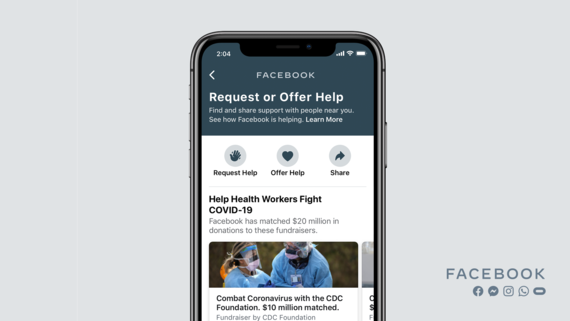The Hill’s Morning Report – Presented by Facebook – Trump touts reopening as virus fatality forecasts trigger alarm
Presented by Facebook
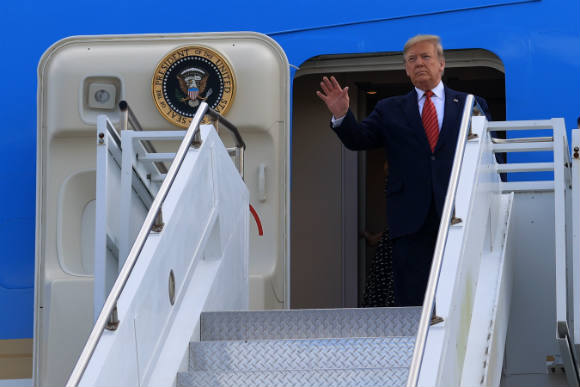
Welcome to The Hill’s Morning Report. It is Tuesday. It’s Cinco de Mayo! We get you up to speed on the most important developments in politics and policy, plus trends to watch. Alexis Simendinger and Al Weaver are the daily co-creators, so find us @asimendinger and @alweaver22 on Twitter and recommend the Morning Report to your friends. CLICK HERE to subscribe!
Total U.S. coronavirus deaths reported each morning this week: Monday, 67,682. Tuesday, 68,934.
President Trump today will board Air Force One and fly to Arizona, where a statewide stay-at-home order remains in place until May 15, even with some limited business activity set to begin on Friday.
Like a lot of Americans, the president is impatient to shake off home confinement and get back to work, which in his case includes a reelection campaign in which his handling of COVID-19 and the worst U.S. unemployment in decades will dog his bid to keep his job.
The president has a rosy message to deliver today at a Honeywell aerospace plant in Phoenix, which is now making face masks. Trump is encouraging Americans that reopening for business is safe if workers follow federal guidelines, and absolutely necessary for the country’s economic survival.
The Washington Post: Trump applauds states reopening ahead of federal guidelines.
Gov. Doug Ducey (R), a Trump ally, is nevertheless taking a go-slow approach to reopening Arizona. His state reported at least 8,919 coronavirus cases as of Monday, including an increase of 279 in a 24-hour period, and 362 deaths. Ducey and anyone else who comes near the president today is supposed to be tested for the virus as part of the new White House security routine for all Trump events.
The public health risks of presidential infection are taken seriously inside the West Wing, while the projected risks of new spikes in COVID-19 contagion are weighed in varying degrees in different states. Trump on Sunday revised his hope that the U.S. death toll from the virus would be at the lower end of disease models released last month, but U.S. fatalities have already blown past that threshold of 60,000 and the president conceded that COVID-19 may kill 100,000 people in the United States or more.
The White House on Monday pushed back against a New York Times report that the administration privately projects a steady rise in coronavirus cases and deaths over the next several weeks. The daily death toll will reach about 3,000 on June 1, according to an internal document obtained by the Times, nearly double the current number of about 1,750. That report and another disease model from the University of Wisconsin often cited by the White House suggest that as the population becomes more mobile, much as Trump is encouraging, infections inevitably rise in the absence of an available cure. With new cases come hospitalizations and more deaths (The Hill).
As Niall Stanage writes, it is a harrowing task for any president to boost the nation’s morale on one hand without succumbing to mistrust from overly rosy projections on the other.
Trump is experimenting with varied narratives to accompany his go-go messaging about economic recovery. One example: accusations that China sat on vital information about a lethal new coronavirus when it roared through Wuhan in December, jeopardizing the world and triggering a pandemic after the communist government refused to be transparent (The Hill).
NBC News: Here’s what we know about how the coronavirus initially emerged from China: U.S. intelligence has concluded COVID-19 is not man-made. There is no intelligence conclusion about how it first infected humans.
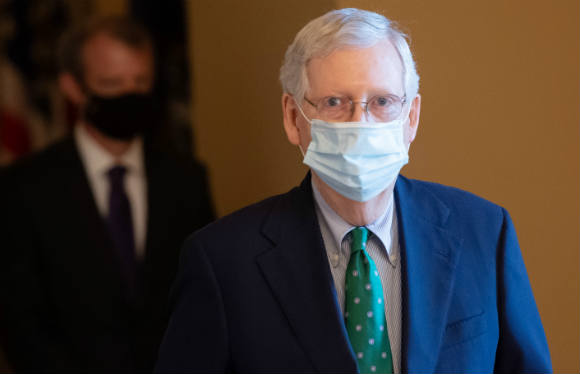
Following the president’s encouragement, the Senate returned to work in the Capitol on Monday to hold the first chamber-wide vote since late March when the $2.2 trillion CARES package passed, 96-0.
Senate Majority Leader Mitch McConnell (R-Ky.), who made his way to the Senate floor in a mask for the first time in public, brought the upper chamber back into session amid concerns from some senators over their safety. On McConnell’s slate for the coming weeks: Clearing a backlog of nominations and work toward an expected CARES 2 package.
“This deadly coronavirus does not take days off, and so the United States Senate has not either,” McConnell said on the floor, pointing to telework and the interim $484 billion relief bill for small businesses. “But now the time has come for us to continue conducting our nation’s business in ways that are only possible with senators here in the Capitol.”
McConnell said he intends to fill “critical posts” across the government in the coming weeks, ranging from public health to national security “that relate directly to the safety of the American people, oversight of our coronavirus legislation and more.” He criticized Senate Democratic leadership for “across-the-board obstruction” in recent years, calling on them to allow voice votes on nominees.
On the other side of the aisle, Senate Minority Leader Charles Schumer (D-N.Y.) criticized the GOP leader for bringing the chamber back while scheduling “no significant COVID-related business” for floor consideration. He pointed to Monday’s vote to confirm Robert J. Feitel to the Nuclear Regulatory Commission and the Senate Judiciary Committee’s hearing this week on the nomination of Judge Justin Walker to join the U.S. Court of Appeals for the D.C. Circuit.
The Democratic leader has focused on the situation in his home state, which has been hard hit by the pandemic. But there are other serious distractions for Schumer: Alexander Bolton reports that some Senate Democrats now favor an independent investigation of former Senate aide Tara Reade’s assault accusations against former Vice President Joe Biden — accusations Biden denies.
Politico: “This is weird”: The Senate returns amid the pandemic.
The Washington Post: Lawmaking in the time of coronavirus: The Senate returns to work, warily.
The Hill: Obstacles mount for deal on next coronavirus bill.
On the House side of the Capitol, leaders are at odds about how members can safely come back into session. The two parties in the House are fighting over the optics of toiling through the coronavirus crisis from a distance as senators don masks to do business in Washington, a hot spot for COVID-19.
As Mike Lillis and Cristina Marcos write, at least one House committee plans to hold a hearing this week, allowing Democrats to showcase the work of oversight conducted by a small group. However, House Minority Leader Kevin McCarthy (R-Calif.) outlined on Monday how the lower chamber can come back into session with social distancing measures.
The California Republican pointed to the need for the type of rapid coronavirus testing the White House offered Congress, which was politely turned down by McConnell and Speaker Nancy Pelosi (D-Calif.). McConnell and Pelosi declined until similar testing procedures can be made more widely available to the public.
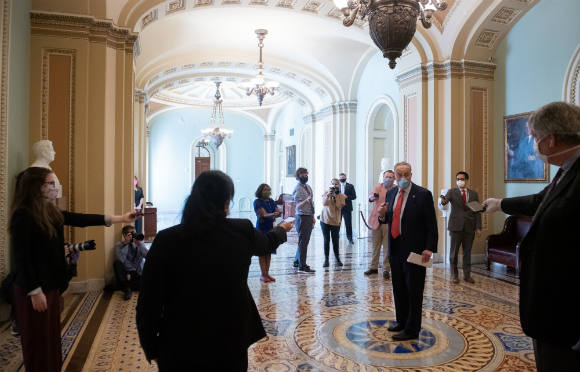
SPONSORED CONTENT — FACEBOOK
If you need help, or can offer it.
In response to COVID-19, people around the world are coming together to help one another in a show of solidarity and resilience. Facebook’s Community Help is a place where you can offer or request help from your local community.
LEADING THE DAY
MORE CONGRESS: Some conservatives have created a new set of boogeymen as they become increasingly critical of stay-at-home orders and the impact on the U.S. economy: Scientists.
After stark warnings from the nation’s most trusted scientists led governors across the country to lock down their states and economies in hopes of slowing the spread of COVID-19, conservative agitators have trained their fire on “elites” as the economic situation has become more dire. As The Hill’s Reid Wilson writes, they blame scientists for what they insist are exaggerations about health risks and, in the process, the creation of a lasting economic crisis.
“A lot of these protestors and a lot of specifically rural Michigan and northern Michigan frustration stem from this idea that you people don’t know what’s best for you and we’re just going to bring in these Harvard educated Ivy league public health experts and they’re going to know better than you and better than your family,” said Michigan state Rep. Beau LaFave (R), a critic of Gov. Gretchen Whitmer’s (D) orders to shut down businesses even in areas where there are few coronavirus cases. “We don’t make public health experts dictators.”
In multiple states under stay-at-home orders and helmed by Republicans, high-ranking political figures have compared directives to those in North Korea, called for protesters to dress as nurses and plan speeches calling for business activities to resume.
> Nominations: Members on the Senate Intelligence Committee are expected to grill Rep. John Ratcliffe (R-Texas) at a hearing later today over his nomination to become the next intelligence chief.
According to The Hill’s Olivia Beavers, the hearing is likely to become contentious as the Texas Republican and Trump loyalist faces anticipated questions about whether he can speak truth to power as the next director of national intelligence (DNI). Recent predecessors have been sidelined by a president who does not tolerate being contradicted, even when it comes to U.S. national security and intelligence information.
Trump nominated Ratcliffe in late February during a White House atmosphere hostile to impeachment and sensitivities about the president’s suspicions there are opponents and adversaries operating inside the administration. Ratcliffe was initially selected for the job in July but withdrew his name following a barrage of criticism he was not qualified. The president later appointed Richard Grenell, the U.S. ambassador to Germany, in an acting capacity. Grenell, seen as a Trump loyalist, had no intelligence experience prior to his appointment.
> Senate contest: Sen. Lindsey Graham (R-S.C.) is facing a tightening race back home as he’s embraced the spotlight as a vocal ally of President Trump’s.
As Jordain Carney reports, Graham, seeking a fourth term in the upper chamber, managed to avoid a high-profile primary fight, a feat Republicans tie to his ardent defense of the president and work atop the Senate Judiciary Committee.
While the South Carolina Republican remains the favorite to win reelection, his rightward shift has inflamed his opposition and support for Jaime Harrison, the former South Carolina Democratic Party chairman.
***
STATE WATCH: A rush and then regret? As about half the states ease back into business, public health experts worry that a public hunger for normalcy will send COVID-19 infection rates and eventually fatalities spiking in just a few short weeks.
“The fact remains that the vast majority of Americans have not been exposed to the virus; there is not immunity, and the initial conditions that allowed this virus to spread really quickly across America haven’t really changed,” said Larry Chang, M.D., an infectious-diseases specialist at Johns Hopkins University (The New York Times).
> California Gov. Gavin Newsom (D) announced on Monday that under new state guidelines, bookstores, music stores, toy stores, florists, sporting goods retailers and others can reopen for pickup as early as Friday. He said more details on the businesses that can reopen would be released later this week. Newsom also said that he is ceding some decision making to local governments for the next phase of a return to business activities in California (Los Angeles Times).
> Virginia: Gov. Ralph Northam (D) extended the widespread shutdown in Virginia through May 14 and said some restrictions will roll back after that. Washington, D.C., Virginia and Maryland together have tallied more than 50,000 cases of COVID-19. Northam said new coronavirus infections are slowing in Virginia, while hospitals are reporting excess bed capacity and enough personal protective equipment moving forward (The Washington Post).
Moviegoers at the Family Drive-In Theatre in Stephens City, Va., (pictured below) kept their distance Friday, eager to get out of the house to see DreamWorks’ “Trolls: World Tour,” which is sold out.
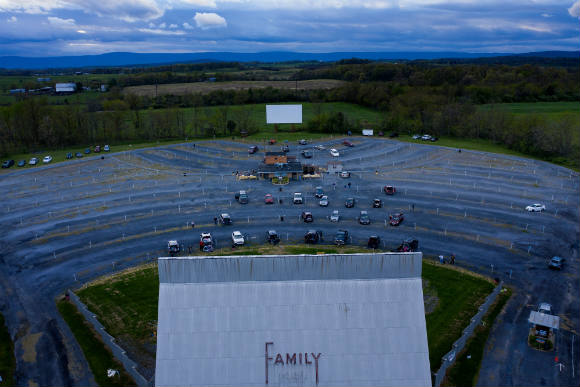
IN FOCUS/SHARP TAKES
INTERNATIONAL: The United States on Monday refused to join a global effort to pledge at least $8 billion toward finding a COVID-19 cure and therapeutics. British Prime Minister Boris Johnson, who has recovered from COVID-19, said the search for a vaccine was “the most urgent shared endeavour of our lifetime,” calling for “an impregnable shield around all our people.” European Union diplomats said the United States, which has the world’s most confirmed COVID-19 cases, was not taking part. A senior U.S. administration official declined to say specifically why the United States was not participating (Reuters).
Reuters: U.K. COVID-19 death toll rises above 32,000, highest in Europe: data.
> India: In New Delhi, officials instituted a 70 percent on retail liquor purchases in a bid to thwart gatherings at stores as the six-week lockdown imposed to slow the spread of the coronavirus is loosened.
Citizens made their way to liquor stores on Monday as restrictions started to be eased, forcing police to use their batons against the massive crowds. Later on Monday, the Delhi state government announced a “special corona fee” to deter the crowds (Reuters).
> South Korea: South Korea reported its lowest single-day increase of cases in more than two months today as sports make their return to the country.
The nation reported only three new confirmed cases and two deaths from COVID-19 as the Korea Baseball Championship held its opening day before crowdless stadiums. Korea’s professional soccer league is also set to return on Friday (The Associated Press).
According to the latest statistics, South Korea has 10,804 confirmed cases of the virus and only 254 deaths.
The Morning Report is created by journalists Alexis Simendinger and Al Weaver. We want to hear from you! Email: asimendinger@digital-staging.thehill.com and aweaver@digital-staging.thehill.com. We invite you to share The Hill’s reporting and newsletters, and encourage others to SUBSCRIBE!
OPINION
The coronavirus is killing thousands. So is the lockdown, by Timothy P. Carney, columnist, Washington Examiner. https://washex.am/2L1mvCA
What Joe Biden needs to do to beat Trump, by David Axelrod and David Plouffe, opinion contributors, The New York Times. https://nyti.ms/2SRhLEb
SPONSORED CONTENT — FACEBOOK
If you need help, or can offer it.
In response to COVID-19, people around the world are coming together to help one another in a show of solidarity and resilience. Facebook’s Community Help is a place where you can offer or request help from your local community.
WHERE AND WHEN
The House will convene a pro forma session at 10:30 a.m.
The Senate meets at 11 a.m. and will consider the nomination of William Evanina to be Director of the National Counterintelligence and Security Center.
The president travels to Phoenix to visit a Honeywell plant that makes medical masks (The Hill). He’ll also participate in a roundtable discussion at noon about Native Americans. A little over two hours after arriving at the plant, he’ll depart to fly back to Washington.
The Coronavirus Report, helmed by The Hill’s Editor-at-Large Steve Clemons, has updates and exclusive video interviews with policymakers emailed each day. Sign up HERE!
Hill.TV’s “Rising” program features news and interviews at http://digital-staging.thehill.com/hilltv or on YouTube at 10:30 a.m. ET at Rising on YouTube.
ELSEWHERE
➔ Layoffs: A victim of declining U.S. passenger travel, General Electric Co. said on Monday it plans to cut the global workforce of its aviation unit this year by as much as 25 percent, or up to 13,000 jobs, including both voluntary and involuntary layoffs (Reuters).
➔ Technology: Apple and Google said on Monday they would ban the use of location tracking in applications that use a new contact tracing system they’re developing to stem the spread of COVID-19. The two companies have cited privacy concerns for the decision, forcing public health authorities to rely on workarounds to detect potential encounters through Bluetooth sensors (Reuters). … COVID-19 tracing apps and privacy tradeoffs (The Associated Press).
➔ National parks: Trump announced last month that he wanted to open parks that had previously closed due to the coronavirus and at least one has reopened. Meanwhile, public health experts are raising concerns that a summer crush of park visitors would pose new COVID-19 transmission risks (The Hill).
➔ Supreme Court: When justices teleconferenced an oral argument for live audio consumption by the public on Monday, they made history. They also inspired the imagination of court artist Arthur Lien, who has sketched the court for decades. Don’t miss the shoe phone!

THE CLOSER
And finally … We wanted to flag seven good things this morning, and they’re doing swimmingly near the U.S. Capitol. Thanks to Roll Call photojournalist Bill Clark, we share this picture of spring captured during a sunny Monday!
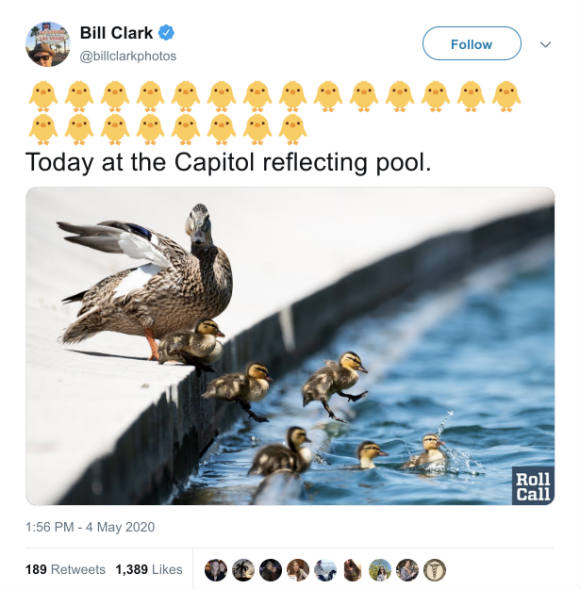
Copyright 2024 Nexstar Media Inc. All rights reserved. This material may not be published, broadcast, rewritten, or redistributed..


